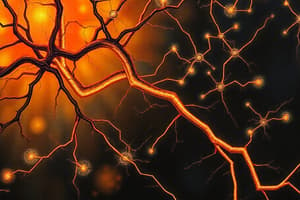Podcast
Questions and Answers
What is the role of sensory organs in the body?
What is the role of sensory organs in the body?
- Directing cognitive centers to make decisions
- Collecting data about the environment and communicating changes to the brain (correct)
- Regulating metabolism and growth
- Initiating responses in the endocrine system
Which sensory organ is responsible for the sense of taste?
Which sensory organ is responsible for the sense of taste?
- Nose
- Tongue (correct)
- Skin
- Ears
What defines reflexes in the body?
What defines reflexes in the body?
- Automatic, involuntary responses without conscious thought (correct)
- Responses that rely solely on muscle spindles
- Direct neural input for all responses
- Conscious, voluntary responses to stimuli
How do reflex actions differ from other responses in the body?
How do reflex actions differ from other responses in the body?
What enables the combination of neurological pathways and neurotransmitter signaling in the nervous system?
What enables the combination of neurological pathways and neurotransmitter signaling in the nervous system?
What is responsible for integrating information received from sensory receptors throughout the body and transmitting it back out via motor neurons to effector cells?
What is responsible for integrating information received from sensory receptors throughout the body and transmitting it back out via motor neurons to effector cells?
Which system uses hormones released into the bloodstream by endocrine glands to regulate various bodily functions?
Which system uses hormones released into the bloodstream by endocrine glands to regulate various bodily functions?
What type of chemical messengers does the endocrine system use for communication?
What type of chemical messengers does the endocrine system use for communication?
Which system ensures rapid communication between different parts of the body for efficient control over movement and other processes?
Which system ensures rapid communication between different parts of the body for efficient control over movement and other processes?
Which gland produces growth hormone that stimulates cell division and tissue growth in the body?
Which gland produces growth hormone that stimulates cell division and tissue growth in the body?
Flashcards are hidden until you start studying
Study Notes
Control and Coordination Overview
Control and coordination refer to two key processes that enable living organisms to function effectively. They involve the regulation of various activities within the body through both internal mechanisms and external influences. Understanding these processes is essential for understanding how life functions, from single-celled organisms like bacteria up to complex multicellular animals like humans. In this article, we will explore different aspects of control and coordination by examining the roles played by the nervous system, the endocrine system, sensory organs, and reflex actions.
The nervous system, comprising the central nervous system (CNS) and peripheral nervous system (PNS), is responsible for integrating information received from sensory receptors throughout the body and transmitting it back out via motor neurons to effector cells such as muscles and glands. This allows for rapid communication between multiple parts of the body, ensuring efficient control over movement and other processes.
Conversely, the endocrine system operates more slowly, using hormones released into bloodstreams by specialized cells called endocrine glands. These chemical messengers circulate until they reach their target tissues where they elicit specific responses. For example, growth hormone produced by the pituitary gland stimulates cell division and tissue growth, while insulin secreted by pancreatic beta cells regulates glucose uptake by cells.
Sensory organs play a crucial role in collecting data about our environment and communicating changes experienced by the body to the brain, which then initiates appropriate reactions based on its interpretation of the information collected. Examples of sensory organs include eyes (vision), ears (hearing), nose (smell), tongue (taste), skin (touch), and proprioception (body awareness).
Reflexes describe automatic, involuntary responses to certain events without conscious thought. Many common examples can be observed daily, such as withdrawing your hand when you touch something hot or blinking when exposed to bright light. Reflexes ensure quick response times bypassing higher cognitive centers, although not all reflexes require direct neural input; some rely solely on muscle spindles detecting changes in muscle length.
In summary, control and coordination are achieved through the combination of neurological pathways and neurotransmitter signaling in the nervous system, along with slower-acting hormonal signals regulating metabolism and growth via the endocrine system. Sensory organs gather relevant data from our environments, allowing us to respond accordingly. Finally, reflex actions offer immediate protection against potential harm without requiring deliberate intervention from higher cognitive centers.
Studying That Suits You
Use AI to generate personalized quizzes and flashcards to suit your learning preferences.




